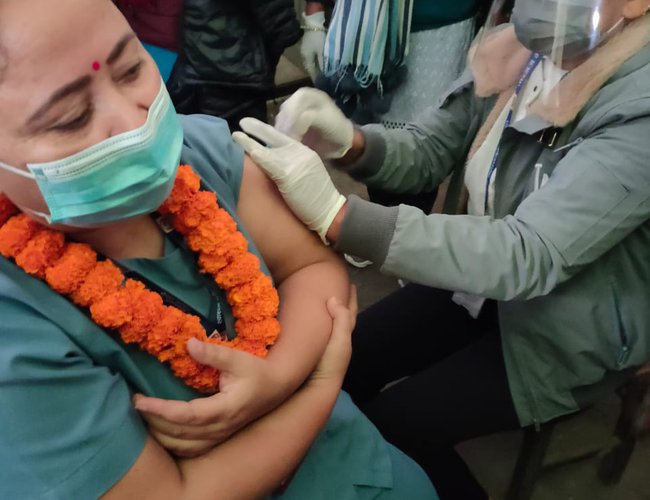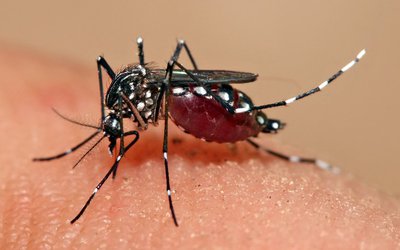
The first vaccination drive in Nepal is unable to meet its target as it is going too slowly in terms of coverage. Nepal was able to inject less than 200,000 people in the past 10 days.
According to the Ministry of Health and Population, in 10 days, 184,745 got the jabs across country The Rising Nepal reported quoting Dr. Shyam Raj Upreti, Coordinator of the COVID-19 Vaccine Advisory Committee at the MoHP, that the number of vaccinated people did not reach 200,000 while our target was to inoculate 430,000 front line health workers in the first phase.
“Firstly, the immunisation booths across the nation have been set at the district headquarters thereby barring the access of health personnel working in the rural areas,” Dr. Upreti told the daily adding, “Secondly, we somewhat failed to generate awareness about the importance of vaccination to overcome the pandemic prior to launching the campaign.”
“I think no one has expected that the vaccination campaign will take place this soon in Nepal,” said Dr. Rabindra Pandey, a public health expert. “This is why it was difficult for many people to take it.”
The Ministry of Health and Population (MoHP) has already started preparations for the second phase of the vaccination drive. The surplus COVID-19 vaccines from the first phase will be used for those falling in priority in the second phase of the inoculation.
Dr. Upreti said that plans were being made to vaccinate people aged above 55 years, as they fall in high risk group of COVID-19.
“We had planned to vaccinate around 430,000 frontline health workers in the first phase. As the number of people getting vaccinated is less than 200,000, the remaining doses of vaccines will be used in the second phase of our vaccination drive,” said Dr. Jageshwor Gautam, spokesperson at the MoHP.
Dr. Gautam added, “The ministry has aimed to inoculate 30,000 government health workers, 60,000 female health volunteers, and 250,000 health workers registered in Nepal Health Council.”
However, as most of the health workers registered at the Council have fled abroad for employment or studies, the number of people receiving vaccines here is lesser than our target, he said.
Dr. Gautam said that along with the front-line health workers, the employees of the immigration offices, customs offices, Tribhuvan International Airport and senior citizens of old age homes were also being inoculated.
China on Friday pledged to provide 500,000 doses of vaccines in grant. Similarly, Nepal will be receiving 2,256,000 doses of COVID-19 vaccines under the COVAX facility, according to the ‘Interim Distribution Forecast’ published by COVAX on Wednesday.
COVAX, co-led by Global Alliance for Vaccine and Immunisation (Gavi), informed that the UN Health Agency would start the distribution of vaccines by the end of February.
‘Covishield’ developed jointly by the Oxford University and AstraZeneca and manufactured by the Serum Institute of India will be provided to Nepal under the facility.
“We are receiving ‘Covishield’ vaccine under COVAX programme which is preferred vaccine for us as the existing storage and transportation infrastructure used in the nation to immunise children can be brought in use,” said Dr. Jhalak Gautam.
“It will not be a problem for us to store the vaccines, as we have infrastructure suitable for it, the main thing is prioritised people must come forward and get the jab with trust and confidence,” added Dr. Gautam.
Government authorities, health experts and workers are found to be excited with the availability of the vaccines much before the expected time. However, people in general and even a few health workers seem lacking confidence on the vaccines. It is evident from the fact that Nepal could cover only less than half of the targeted number of people in the first phase of vaccination.
For a successful vaccination drive, people’s trust towards the vaccine is necessary. But it was found lacking in Nepal.
- PM Oli Returns Home Attending UN FFD4 Summit
- Jul 05, 2025
- Trump signs into law domestic policy bill
- Jul 05, 2025
- Putin-Trump call after US halts some arms shipments to Ukraine
- Jul 04, 2025
- USAID programs officially suspended
- Jul 03, 2025
- Thailand’s Constitutional Court suspended PM Paetongtarn Shinawatra
- Jul 02, 2025














